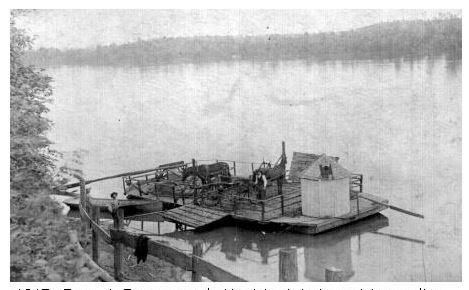Milton Egner
Written by Justin Lamb
Egner’s Ferry owned by Milton Egner from 1848 to 1878.

A native of North Carolina, Milton Egner arrived in the Jackson Purchase region in the 1830s settling along the Tennessee River in what is now present day Aurora. Described as a “very rough” and exacting person, Egner was an astute businessman who operated a successful grist mill, stage coach, and ferry in the Aurora area.
The Egner Ferry was operated along the Tennessee River and connected the Jackson Purchase area to the Between the Rivers section of Trigg County. The ferry was located just south of the present day Eggner’s Ferry Bridge and was purchased from Charles McDonald in 1848, just only six years after Marshall County’s founding. The first ferry operated with oars until it was replaced with a blind mule walking in a circle on the boat deck hitched to the end of a sweep pole. Later when technology and money could afford, the ferry was powered by a steam engine. Egner also owned a general merchandise store near the ferry. Egner sold the ferry in 1878 to his daughter, Henrietta Agnes Hillman. Many locals in the area began calling the ferry the “Agnes Ferry” after Henrietta while others called it the Egner’s Ferry.
Milton Egner’s stagecoach ran from Hopkinsville to Murray before ending at Columbus, Kentucky located on the Mississippi River. According to the History of Marshall County, Kentucky published in 1984, some of the men who drove the coaches and freight wagons were J. Combs, M. Cooper, M. Sears, and R. Cress. Egner ceased operations of the stagecoach in 1880.
During the War Between the States, Egner was a strong Southern sympathizer and used his ferry and stagecoach to assist with the Southern cause. It was said after the skirmishes on the upper Tennessee River, many dead soldiers would float down the river near Egner’s Ferry and those wearing Yankee uniforms were cursed by Egner, pushed by the boar, and allowed to float down river. Those wearing Confederate uniforms were taken from the water by Egner and buried in a nearby by field. If the Confederate soldier had any sort of identification on his body, Egner would personally take it upon himself to notify the dead soldier’s relatives.
Milton Egner sold all of his business interests and property except a small homestead just north of the Ferry in 1880. It was at this homestead that he and his wife Sarah would live out the remainder of their days. Milton passed away in 1889 while Sarah followed him in 1906.
